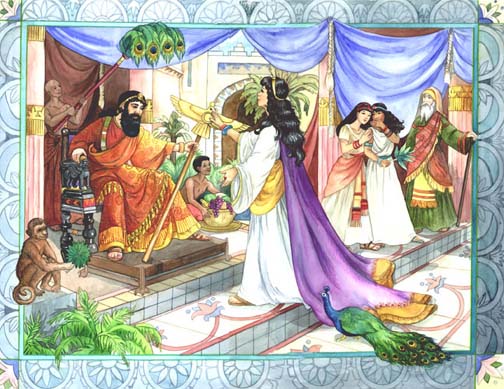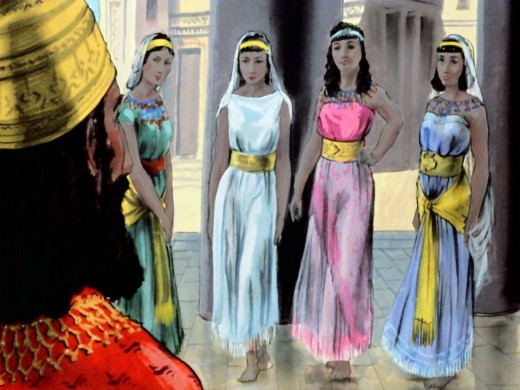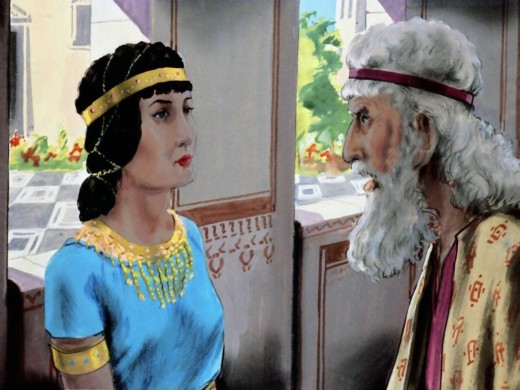QUEEN ESTHER
Updated on September 18, 2010
Woman Of Courage - Part I
Vashti, queen of Persia, was the most powerful woman in the Middle East, yet her power was as fragile as a candle in a storm. Her husband, Xerxes, (pronounced 'zur-zees') had just summoned her to appear before a festive gathering of his nobles. Vashti, however, had no intention of parading herself like a prized cow in front of a herd of drunken men, and she refused. What should be done to punish her insolence? One of the Kings' counselors spoke for all: "Queen Vashti has done wrong, not only against the King but also against all the nobles and the peoples of all the provinces of King Xerxes. For the Queens' conduct will become known to all the women, and so they will despise (have no respect) for their husbands and say, 'King Xerxes commanded Queen Vashti to be brought before him, but she would not come'. There will be no end of disrespect and discord".
So poor Vashti bore the brunt of every man's fears. She who had refused the royal summons was forever banished from the royal presence, and a great domestic uprising was stopped before it even began.
After a while, a search was conducted for a new queen to replace Vashti. Many Jews were living in Persia at the time. Exiled from Judah a hundred years earlier (After Jerusalem's fall in 587 B.C), they had been brought to Babylon, which in turn was conquered by Persia. Mordecai and his orphaned cousin Esther were among those living in exile, 650 miles northeast of Jerusalem.
Like many other young virgins, the beautiful Esther was gathered into the King's harem. To refuse the privilege may well have meant her death. Counseled by Mordecai to keep her Jewish origins a secret, she spent the next twelve months awaiting her tryout with the King. When the moment came, Esther so pleased Xerxes that she became queen in Vashti's place. Some time later, an Amalekite named Haman rose to power in Persia. Haman was so highly placed that other officials knelt before him as a sign of respect. One man, however, the Jew Mordecai, refused to kneel. Haman became angry that he decided to eliminate every Jew in the Kingdom.
To choose the best time to destroy them, Haman consulted his gods by casting lots. A date eleven months into the future was revealed. Haman immediately persuaded King Xerxes to issue a decree that all the Jews in his realm were to be slaughtered on that day. By way of incentive, the decree proclaimed that anyone who killed a Jew could plunder his possessions. Mordecai reacted immediately by contacting Esther and asking her to beg King Xerxes for mercy. But Esther was afraid and replied, "For any man or woman who approaches the King in the inner court without being summoned the King has but one law: that they be put to death. The only exception to this is for the King to extend the gold scepter to him/her and spare his/her life. But thirty days have passed since I was called to go to the King."
Mordecai replied, "Do not think that because you are in the King's house you alone of all the Jews will escape. For if you remain silent at this time, relief and deliverance for the Jews will arise from another place, but you and your father's family will perish." On the third day, Esther approached the King. As soon as King Xerxes saw her, he held out the golden scepter. "What is it, Queen Esther"? he asked. "What is your request? Even up to half the Kingdom, it will be given to you." But Esther merely invited the King and Haman to join her that evening for a banquet she had prepared especially for them. That evening the King again pressed her to ask for whatever she desired, but Esther simply invited the King and Haman to another banquet, to be held the following night. That evening, on his way home, Haman caught sight of Mordecai, sitting smugly rather than kneeling as he passed by. Haman was outraged, but his wife consoled him by proposing an evil scheme, he need merely build a gallows and then ask the King to hang Mordecai on it the next morning.
The night before the banquet the King couldn't sleep. He told one of his servants to read to him the royal chronicles. The King's servant read allowed how Mordecai had averted the earlier plot to assassinate the King (Esther 6:1,2). Reminded of this event the King asked his servant, "What honor or dignity has been bestowed on Mordecai for this"? The servant responded that nothing had been done. This shocked the King. This oversight could forever tarnish the King's otherwise magnificent reign. The King asked if someone of high rank might be present in the court to help correct this oversight. The Kings' servants said that Haman had just entered the court. "Bring him in to me", said the King.
Check out Queen Esther part II.
Bottom two (2) pictures used with permission from:
http://www.theglorystory.com







